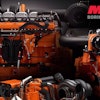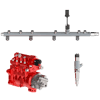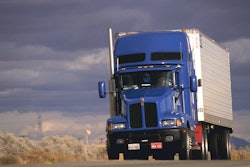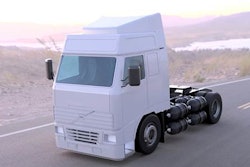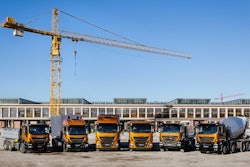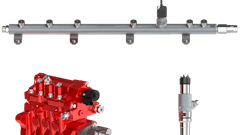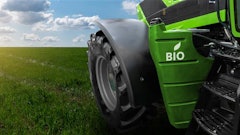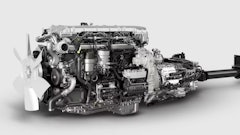North America’s top fleets have spoken, and their #1 choice for greening their fleet operations is the use of biodiesel blends in their diesel vehicles. According to a new 2018 Fleet Purchasing Outlook study conducted by the NTEA – The Association for the Work Truck Industry – 75% of fleet respondents planning to acquire trucks in 2018 anticipate maintaining or increasing use of diesel engine powered trucks, indicating that diesel is still the powertrain of choice among the majority of work truck fleets. Additionally, the survey indicated that biodiesel is now the most popular alternative fuel option on the market, followed by E85, CNG and Electric Hybrid. Survey data shows 18% of fleet participants use biodiesel now – up from 15% in 2017. And in terms of future alternative fuel interest, biodiesel also takes top honors, with more fleets planning to acquire or continue using biodiesel than any other alternative fuel option.
Each year, NTEA conducts a comprehensive Fleet Purchasing Outlook Survey to better understand the commercial vehicle landscape, including interest levels for advanced truck technologies and alternative fuels. The new survey results for 2018 were recently published and reflect positive trends for the use of biodiesel blends in the diesel vehicle technology of yesterday, today and tomorrow.
Don Scott, Director of Sustainability for the National Biodiesel Board, comments, “The findings of this survey validate what we have been hearing from fleets. While other technologies get attention from time to time, biodiesel is consistently the best way to store solar energy for transportation use. Nothing beats the power and performance of a new technology diesel engine to get the job done in heavy haul or high mileage operations. And when fleets learn that they can immediately reduce their greenhouse gas emissions by using biodiesel blends in their existing diesel equipment, it is truly a win-win.”
Spanning the United States and Canada, the 2018 NTEA Fleet Purchasing Outlook Survey respondents included a diverse pool of fleet professionals representing a broad range of fleet sizes, vehicle weight classes and vocational truck applications. From government and municipal fleets, to construction, delivery and utility sectors, to agriculture and private industry sectors – fleets across the country are relying on the power and performance of biodiesel, America’s Advanced Biofuel, to get the job done.
Steve Latin-Kasper, NTEA Director of Market Data and Research, comments, “Nearly 40% of respondents indicated they currently operate alternative-fueled trucks in their fleets, up 4% from 2017, and interest is at the highest recorded level since 2014. While interest in alternative fuels may wax and wane a bit due to the inherent volatility of oil prices, it will likely rise steadily across time. Most fleets are well aware of the need to keep exploring clean energy solutions.”
Customers from coast to coast have used B20 (a blend of 20% biodiesel with 80% ultra-low sulfur diesel) successfully in virtually every make and model diesel engine, and the vast majority of new diesel engines now have full OEM support for B20 meeting today’s ASTM specifications. In the ever-increasing drive to cut carbon and lower CO2 emissions, forward-looking fleets are using biodiesel blends as an easy and cost-effective way to reduce their carbon footprint in their existing diesel vehicle fleet. Compared to fossil fuels like petrodiesel, B20 reduces carbon by 16% on average, with B100 reducing carbon by 80%. According to the California Air Resources Board, using biodiesel reduces carbon substantially more than an electric vehicle if the electricity used in that vehicle is produced from a natural gas or coal fired power plant.
The National Biodiesel Board (NBB) will be featuring some of the latest industry advancements this week at the Alternative Clean Transportation (ACT) Expo, April 30 - May 3 at the Long Beach Convention Center. On display will be a customized 2018 Freightliner Cascadia truck supplied by NBB member company Optimus Technologies. Optimus designs and builds EPA-compliant biodiesel conversion systems (Vector Systems) with integrated telematics to enable medium and heavy-duty diesel engines to operate on up to 100% biodiesel in sub-zero temperatures. With its controller and second heated B100 tank system, Optimus is providing fleets using diesel with a trouble-free and proven way to use high quality, EPA registered B100 biodiesel in existing vehicles and reduce carbon by up to 80% at a fraction of the cost of conversion to other fuel alternatives that don’t provide as much carbon reduction, like compressed natural gas.
New this year, NTEA added renewable diesel options to its Fleet Purchasing Outlook Survey in order to gauge directional movement for this fuel type in coming years. Among survey participants, renewable diesel came in at 3% of future alternative fuels interest. To help address this interest, especially in California as part of the California Low Carbon Fuel Standard, NBB member company Renewable Energy Group (REG) is now offering California customers a patent-pending blend of biodiesel and renewable hydrocarbon diesel.
Made from an increasingly diverse mix of resources such as recycled cooking oil, soybean oil and animal fats, biodiesel is a renewable, clean-burning diesel replacement that can be used in existing diesel engines without modification. It is the nation’s first domestically produced, commercially available advanced biofuel. Biodiesel supports roughly 64,000 jobs across the United States. The National Biodiesel Board is the U.S. trade association representing the biodiesel and renewable hydrocarbon diesel industries, including producers, feedstock suppliers and fuel distributors.
